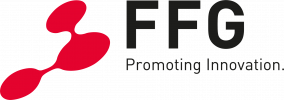National Projects
The listed projects are supported by national funding agencies and contribute to strengthening innovation, academic excellence.

The Austrian Research Promotion Agency

The Austrian Research Promotion Agency
H2REAL: “Hydrogen Region East Austria goes Live”
The flagship project H2REAL (Hydrogen Region East Austria goes Live) aims to develop an integrated H2-network (a “Hydrogen Valley”) as a key enabler for hydrogen technology and applications in the eastern Austrian region. To achieve this goal, existing as well as new technologies will be integrated along the entire hydrogen value chain developing an innovative and holistic solu-tion. This will lead to major emission reductions, decarbonization of all sec-tors and cost reduction for green hydrogen.
The flagship project H2REAL (Hydrogen Region East Austria goes Live) aims to develop an integrated H2-network (a “Hydrogen Valley”) as a key enabler for hydrogen technology and applications in the eastern Austrian region. To achieve this goal, existing as well as new technologies will be integrated along the entire hydrogen value chain developing an innovative and holistic solu-tion. This will lead to major emission reductions, decarbonization of all sec-tors and cost reduction for green hydrogen.
CHASE FP2
CHASE drives the transformation of chemical process industries toward greater efficiency, flexibility, and sustainability. Modern production networks are complex, energy-intensive, and vulnerable to disruptions—CHASE addresses these challenges through a systems engineering approach that integrates process digitalization, intensification, and circular process streams. By converting critical (bio)chemical data into digital knowledge twins and dynamic process models, CHASE enables smarter, interconnected, and more sustainable production chains. In its second funding phase, CHASE expands its research to include recycling, upcycling, and circular material streams, working with 20 industrial partners and six leading scientific institutions to establish an open hub for sustainable chemical manufacturing in Austria.
CHASE drives the transformation of chemical process industries toward greater efficiency, flexibility, and sustainability. Modern production networks are complex, energy-intensive, and vulnerable to disruptions—CHASE addresses these challenges through a systems engineering approach that integrates process digitalization, intensification, and circular process streams. By converting critical (bio)chemical data into digital knowledge twins and dynamic process models, CHASE enables smarter, interconnected, and more sustainable production chains. In its second funding phase, CHASE expands its research to include recycling, upcycling, and circular material streams, working with 20 industrial partners and six leading scientific institutions to establish an open hub for sustainable chemical manufacturing in Austria.

Austrian Science Fund

Austrian Science Fund
Cluster of Excellence microPlanet: “Microbiomes Drive Planetary Health”
Our Cluster of Excellence (CoE) aims to fundamentally understand and manipulate environmental and host-associated microbiomes to benefit planetary health. By bridging the gap between traditionally separate medical and environmental microbiome research (termed red and green fields, respectively), we seek to achieve a unified approach to studying microbiomes. Our research is structured around three key areas: interactions within microbiomes, their response to perturbations, and strategies for monitoring and intervening with microbiome dynamics. Our interdisciplinary teams will conduct seven joint research projects, leveraging shared resources and methodologies to generate comparable data across medical and environmental microbiomes. This integrated effort will pioneer new methods linking genetic diversity to function, transcending traditional research boundaries from genes to ecosystems. Our goal is to establish microbiome research as a core component of planetary health science, fostering a new understanding of microbiomes’ role in mitigating global change and supporting a sustainable future.
Our Cluster of Excellence aims to fundamentally understand and manipulate environmental and host-associated microbiomes to benefit planetary health. By bridging the gap between traditionally separate medical and environmental microbiome research (termed red and green fields, respectively), we seek to achieve a unified approach to studying microbiomes. Our research is structured around three key areas: interactions within microbiomes, their response to perturbations, and strategies for monitoring and intervening with microbiome dynamics. Our interdisciplinary teams will conduct seven joint research projects, leveraging shared resources and methodologies to generate comparable data across medical and environmental microbiomes. This integrated effort will pioneer new methods linking genetic diversity to function, transcending traditional research boundaries from genes to ecosystems. Our goal is to establish microbiome research as a core component of planetary health science, fostering a new understanding of microbiomes’ role in mitigating global change and supporting a sustainable future.
Why Funding?
Funding plays an essential role for research groups as it provides resources and support for scientific progress. Our research group is fortunate to receive funding from the European Union (EU), our national funding agencies and industry. This enables us to conduct innovative research in the field of vibrational spectroscopy and recruit, motivated young researchers to work on scientific projects.